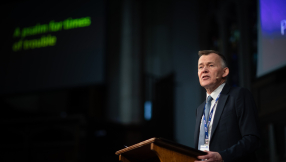
Have you ever tried to change a stubborn habit, but found it so frustratingly stubborn that no matter what you've done, it stays there? Don't lose heart, my friend. Here's a surefire way that will help you get rid of it.
Surrender it to the Lord
Friends, oftentimes we try to change a bad habit and replace it with a better one, and find ourselves failing because we haven't surrendered it – and ourselves – to the Lord. The Bible presents to us various people who, after surrendering themselves to God, began living lives opposite of how they used to live. Here are some examples:
1. The apostle Paul
Paul, then named Saul, used to persecute Christians relentlessly, even giving approval to the stoning of the martyr Stephen in Acts 7. However, while he was on another mission to persecute Christians in Damascus, he was confronted by the risen Lord Jesus on the road (see Acts 9).
Paul surrendered to Christ that very moment, and from then on we all know the story of the man who, in just a short moment, became a true-blue Christ follower unto death, one who passionately turned his back on sin.
2. Zacchaeus
Zacchaeus was a rich man, most likely amassing his wealth through corrupt means because he was the chief tax collector during his time. However, because he turned to Jesus, he was able to find strength and grace to change his ways.
Zacchaeus began to give his possessions to the poor and repaid all that he had stolen, even up to four times the amount. Scholars say he probably became poor after that, but history tells us that he had incomparable joy in turning to Christ Jesus (see Luke 19:1-10).
Want to experience what they did?
Do you want to experience the change that these men experienced, having the strength to discard all bad habits and replace them with good and righteous ones? Here's what you should do.
1. Honestly confess your sin to God
My friend, no habit will be changed if we decide to hide it, keep it, or convince ourselves that it's right when it's wrong. God, who knows all things, knows what we're hiding, so better come to Him openly and honestly. Don't worry: He knows all that we've done, but loves us anyway. And He's committed to taking out all the unrighteousness inside us as we confess them all to Him (see 1 John 1:9).
2. Cry out for help
After confessing your sins, including sinful thoughts and mindsets, ask God for His help. Desperately. As if you won't be able to change unless He helps. Because we are nothing apart from Christ (see John 15:5), and because deliverance can only come from God (see Proverbs 21:31; Acts 4:12; Revelation 7:10), this is the only way. We can't change ourselves, only God can.
3. Obey His Word
After confessing and crying out for help, we then need to read His Word and obey it. His instructions, precepts and laws help us live the life He wants us to live: a life lived for His pleasure (see 2 Timothy 3:16-17). Christ, the Word became flesh (see John 1:14), has given us the way to live (see John 14:6). Let's live by it.













